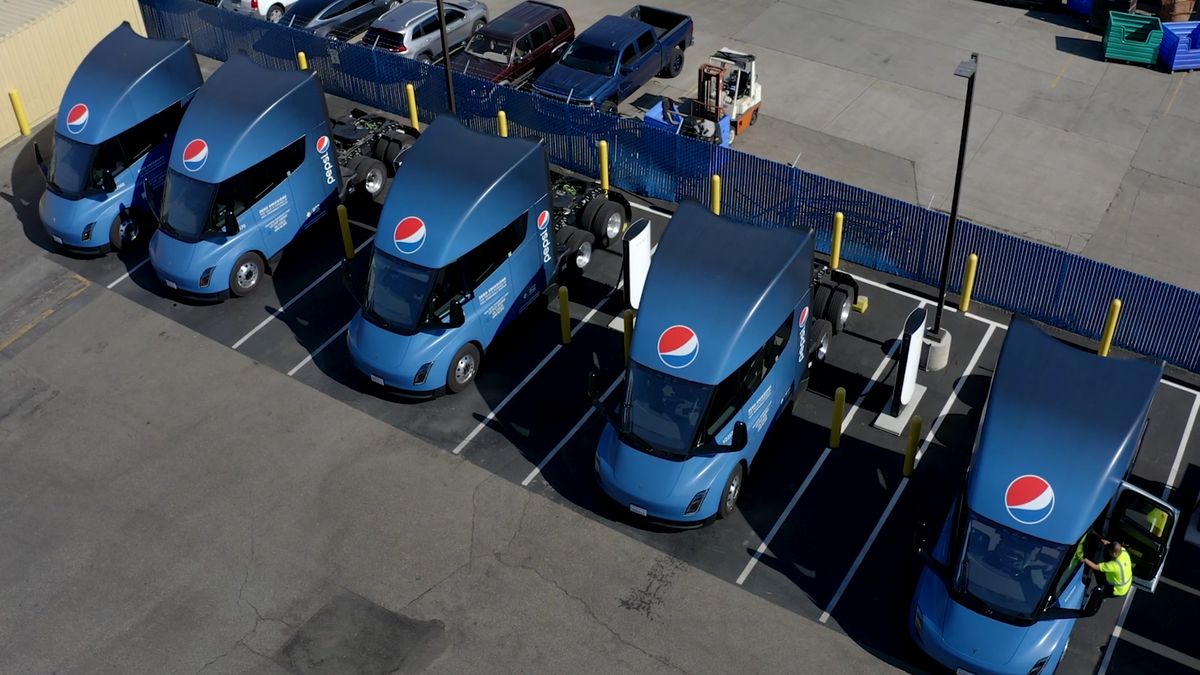Real world testing data shows that the Tesla Semi truck can travel about 400 miles per charge, and recharge to 80 percent in just 45 minutes. Considering just how large the onboard battery pack is (roughly the size of ten Model S packs) that’s not too shabby. In a recent three-week test across 22 electric freight-hauling tractors, the Tesla came out on top in terms of miles driven, and proved that the EV trucks can do just as much work in a day as their diesel counterparts.
Compared to its competition from Nikola, BYD, Freightliner, and Volvo, the Tesla Semi had more on-the-road uptime and covered more miles in a day than any other electric truck. PepsiCo has a few dozen Semis in service right now in Northern California, and one of its drivers travelled 1,076 miles in a single day during the test, stopping for three brief partial-battery charges, and did all of that while hauling over 70,oo0 pounds of truck and beverage.
“When we looked at the metrics during the run, we were very pleased with how the Semi performs,” said Amanda DeVoe, director of PepsiCo’s fleet transformation and strategy. “What was most meaningful is that the Semi aligned with how our business operates.”
For eighteen days, beginning on September 11, the North American Council for Freight Efficiency tracked all of these trucks for information on charging infrastructure, cost of ownership, driving performance, and more. Not every truck in the test was active every day, and it doesn’t appear any of the drivers were going out of their way to set new distance or charging records along the way.
Tesla may have won out on this test because its Pepsi drivers were more focused on long-distance distribution, while other manufacturers represented were making more frequent regional stops. For example, the longest mileage day for the Tesla Semi incorporated just five stops, while the Nikola made 13 deliveries and one of the eCascadias did 10.
One of the major epiphanies experienced during this test was that perhaps fast charging is more important than outright range. These big trucks are capable of charging at mega-quick 750kW chargers in their depots, meaning a smaller (and less expensive) battery may be advisable for the shorter range regional transports. Mid-shift charging is potentially a huge benefit to smaller carriers, saving them tens of thousands of dollars on the initial purchase of their tractor, if they can get away with a smaller battery.
More important perhaps than Tesla’s electric victory is that Pepsi is capable of hauling as many miles in a day with an electric truck as it can using expensive and polluting diesel. There aren’t enough hours in a shift to get a driver to do much more than 1000 miles anyway, so the three stops for charging proved to not be a detrimental time suck, and efficiency was high enough to make the trips viable.
Tesla has yet to scale Semi production, lagging well behind the likes of Freightliner or Volvo. Additionally, Freightliner and Volvo already have decades of proven track record, reliability, and service. It’ll take many years of working in this industry for Tesla to gain the trust of truckers and trucking companies alike, if they ever do ramp production to a similar level.

